Friday 21 November 2014 at 22h56
The 2014 cycling season has now come to an end and while the African MTN-Qhubeka team is about to start preparing the 2015 season with a training camp from 23-30 November at the Spier Wine Farm in the Western Cape of South Africa, we felt it would be good to get back on how the team performed in its first Grand Tour, the Vuelta a España 2014.
With a new UCI Pro Continental Team licence for the team, for the 3rd year in a row, the African team is hoping to participate in the Tour de France this year and the invitation for the Tour of Qatar and for the Tour of Oman by A.S.O. (the same organisor as the Tour) might be a good start towards this goal.
CONTINUE READING AFTER THIS ADVERTISEMENT
MTN-Qhubeka in the 2014 Tour of Spain
On 23rd August MTN-Qhubeka made history as the first African team to compete in a Grand Tour - La Vuelta (the Tour of Spain). For a Pro Continental team with a budget of just 4 million euros this was a significant achievement and an important milestone in the journey to the Tour de France. There are many features of MTN-Qhubeka which make them both interesting and unique in the pro peloton. They are Africa's first and only Pro Continental cycling team, and race to raise awareness of the charity Qhubeka. In the words of team principle Douglas Ryder "this provides a hand up rather than a hand out" and mobilises under-privileged people with bicycles. The Qhubeka charity also helps develop grass roots cycling in Africa in addition to implementing environmental projects.The selection of MTN-Qhubeka's riders for the 2014 Vuelta surprised many, leaving out Grand Tour stage winners Linus Gerdemann and Ignatas Konovalovas. Instead, the team focused on one of it's core values, developing young African cycling talent. The squad for the Vuelta included both Gerald Ciolek from Germany and Sergio Pardilla of Spain. Both riders have proved invaluable at MTN-Qhubeka by mentoring young riders and helping African riders adapt to the rigours of European racing. Italian sprinter Kristian Sbaragli also made the cut as a lead-out man for Gerald Ciolek.
The remaining six riders were all African, with Jay Thomson, Jaco Venter, Louis Meintjes and Jacques Janse Van Rensburg all being South African. Jay Thomson and Jaco Venter were selected in supporting roles, having established themselves as breakaway specialists and team workers. Jacques Janse Van Rensburg and South African Road Race Champion Louis Meintjes were selected based on their climbing ability.
Eritrean riders Merhawi Kudus and Daniel Teklehaimanot made up the final two positions in MTN-Qhubeka's Vuelta squad. Teklehaimanot has consistently proven his strength against the watch and in long breakaways, while Kudus has incredible climbing ability. In his first season as a professional he finished second at the Tour of Langkawi. Both Eritrean riders have followed a fascinating path into professional racing and are both graduates of the World Cycling Centre Africa (WCCA). Based in Potchefstroom, South Africa, this has Jean-Pierre van Zyl both as Director and key driving force. He is supported by Andrew Smith who is coach and director sportif, in addition to many other duties. The WCCA are an increasingly important feeder to MTN-Qhubeka, playing a key role in the development of young African riders. A detailed article on the WCCA will feature in a future edition of Velowire. Jean-Pierre van Zyl was incredibly humble when describing what it meant to have former WCCA riders on the Vuelta start-line:
Speaking with WCCA Team Manager Andrew Smith it quickly became apparent the WCCA does an incredibly professional job, despite operating on a tiny budget. It has been exceptionally effective at identifying and developing talented African riders to professional level. In conversation with Andrew he modestly highlighted:
- The WCCA's legacy stretches wider than MTN-Qhubeka, as this year's Vuelta will see the largest contingent of Africans ever in a Grand Tour. With Europcar fielding Eritrean Champion Natnael Berhane who also passed through the WCCA and Namibian Dan Craven who's raced with the WCCA on numerous occasions, the riders have made the most of the opportunities Jean-Pierre and the Centre have given them.
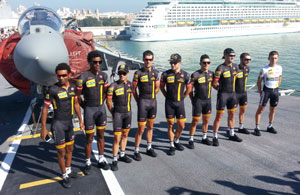 MTN-Qhubeka Team Principle Doug Ryder has been at the heart of the team from its conception, daring to dream that one day an Africa Team would race at the Tour de France. Prior to the start we asked him to comment on what MTN-Qhubeka's participation in La Vuelta meant at a personal level. He made this poignant statement ...
MTN-Qhubeka Team Principle Doug Ryder has been at the heart of the team from its conception, daring to dream that one day an Africa Team would race at the Tour de France. Prior to the start we asked him to comment on what MTN-Qhubeka's participation in La Vuelta meant at a personal level. He made this poignant statement ...- So few people realise a dream and most of the riders here dreamed of racing in a Grand Tour. That's something amazing, as not many people realise a dream. We are at the dawn of exposing African cycling to the world.
Despite the romanticism of MTN-Qhubeka's participation in it's first Grand Tour, the severity of the test was readily apparent. Cycling grandees Alberto Contador and Chris Froome were both looking to make amends for injuries sustained at the Tour de France while Alejandro Valverde was highly motivated to make the podium in his home tour. From the outset, it was clear this would be an exceptionally tough race and for MTN-Qhubeka a baptism of fire. As a team making its Grand Tour debut there were many highlights, surprises and disappointments during 21 action packed stages. Here are just a few ...
Stage 1 - MTN-Qhubeka team were given a warm welcome by La Vuelta a España organisation, having to interrupt their time trial preparation with a horse drawn tour of Jerez de la Frontera. Despite this, the team remained focused, finishing in 12th place, just 2 seconds behind Team Sky and ahead of Astana, IAM Cycling and Garmin-Sharp. If anyone was in doubt, this sent a clear message: MTN-Qhubeka was at La Vuelta to race.
Stage 2 - Was the first mass start road stage and saw Jacques Van Rensburg in a day long breakaway which held out until 16 kilometers from the finish. The stage came down to a sprint finish which was won by Nacer Bouhanni, but the Qhubeka charity were also winners. Jacques Van Rensburg’s sustained presence at the head of the race gained the charity a huge amount of television exposure.
Stage 3 - This covered 198 kilometers from the port of Cadiz to Arcos de la Frontera, and the four categorised climbs provided 2500m of climbing, making it a tough one. Despite his efforts the previous day, Jacques Van Rensburg recovered well to ride strongly and represent MTN-Qhubeka in the breakaway. This gained more valuable publicity for the Qhubeka charity, and importantly took the pressure off other MTN-Qhubeka riders so they could attack later in the race. At the finish victory went to Orica-GreenEDGE's Michael Matthews.
Stage 4 - As the youngest rider at La Vuelta, 20 year-old Merhawi Kudus was enthused to make his Grand Tour debut. It is nice to have the experience to ride in my first Grand Tour, and also race with friends and top professionals. However, a serious crash resulted in extensive road rash and deep lacerations, which required stitches. This exposed Merhawi to the harshest side of the sport. Rather than battling for good results, the severity of his injuries made every stage a painful fight of survival.
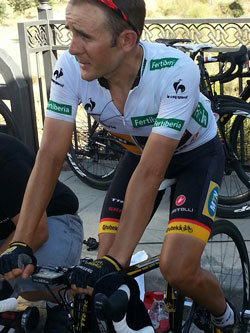 Stage 5 - From the outset, MTN-Qhubeka's 'dream objectives' were to take a stage win or claim a jersey. The team's solid stage 1 time trial, coupled with super-consistent riding by Sergio Pardilla, put him within striking distance of the white 'Combined Classification' jersey. This is awarded to the rider with the best overall positions from the 'General', 'Sprints' and 'Mountains' classifications. On stage 5 Sergio attacked on the 800m long Puerto El Saltillo, taking the mountains points at the summit. This was not just a surprise to the peloton but to La Vuelta organisation, which were so shocked they failed to notify MTN-Qhubeka about the post stage jersey presentation. Incredibly, and for the second year in succession MTN-Qhubeka's Sergio Pardilla had taken a leader's jersey in a major tour (see our previous article with a flashback on 2013. The white 'Combined' classification jersey went first to Valverde and then finally came to rest on the shoulders of Alberto Contador.
Stage 5 - From the outset, MTN-Qhubeka's 'dream objectives' were to take a stage win or claim a jersey. The team's solid stage 1 time trial, coupled with super-consistent riding by Sergio Pardilla, put him within striking distance of the white 'Combined Classification' jersey. This is awarded to the rider with the best overall positions from the 'General', 'Sprints' and 'Mountains' classifications. On stage 5 Sergio attacked on the 800m long Puerto El Saltillo, taking the mountains points at the summit. This was not just a surprise to the peloton but to La Vuelta organisation, which were so shocked they failed to notify MTN-Qhubeka about the post stage jersey presentation. Incredibly, and for the second year in succession MTN-Qhubeka's Sergio Pardilla had taken a leader's jersey in a major tour (see our previous article with a flashback on 2013. The white 'Combined' classification jersey went first to Valverde and then finally came to rest on the shoulders of Alberto Contador.Stages 5 and 8 - Although Gerald Ciolek's second place at the Tour of Denmark showed he had good form just prior to La Vuelta, by his high standards he had a quiet tour. Struggling with temperatures of 40°C, he demonstrated his consummate professionalism by directing his energies and experience to helping his team-mates. Firstly by helping Sergio Pardilla maintain a good GC position and then helping several of the African riders to get into breakaways.
On stages 5 and 8 Kristian Sbaragli was given his chance to sprint for glory and didn't disappoint finishing 9th. A few days later he finished with the fastest sprinters in the world in a very creditable 7th place. This demonstrated the 24 year old's exceptional ability in bunch finishes, which was even more impressive considering the absence of a lead-out train.
Stage 14 - This featured a beautifully orchestrated and aggressive piece of team riding by MTN-Qhubeka. With a fairly flat first half of the stage and a steep mountain top finish, there was a chance for a breakaway to make it to the finish. By 50 kilometers, 23 riders had broken clear, including three riders from MTN-Qhubeka: Jaco Venter, Jacques Van Rensburg and Louis Meintjes. Even though Jaco Venter's powerful 73 kg physique gave him no chance of victory at the finish, he was essential to the move. On the flatter roads he pulled the break along, opening up a significant gap, while Van Rensburg worked to maximise the opportunities for Meintjes on the final climb. By the final ascent there just 8 riders and Meintjes was one of the first to attack. At the line it was Garmin-Sharp's Ryder Hesjedal who took victory, with Meintjes taking a fine 5th place. Prior to the race Meintjes said: At the Vuelta I'm looking just to finish and be happy with my performance. Its difficult to talk about results as we have never raced at this level, so I can’t expect this or that. For the 22-year-old Grand Tour debutant finishing in the top five on a mountain stage was an outstanding performance and makes him an exceptionally exciting prospect for the future.
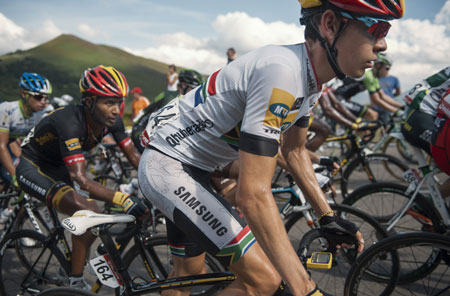
Louis Meintjes leads Merhawi Kudus - picture courtesy of Ilona kamps
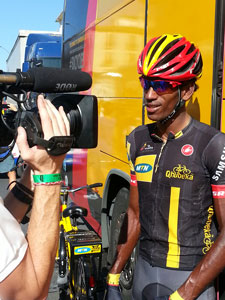 Stage 17 - After a strong breakaway showing on stage 7, Daniel Teklehaimanot was again on the attack on stage 17. He was a key driver in the five-man breakaway, averaging more than 300 Watts for the stage. Even this heroic effort was insufficient to keep him clear of the bunch and Teklehaimanot was caught 20 kilometers from the finish.
Stage 17 - After a strong breakaway showing on stage 7, Daniel Teklehaimanot was again on the attack on stage 17. He was a key driver in the five-man breakaway, averaging more than 300 Watts for the stage. Even this heroic effort was insufficient to keep him clear of the bunch and Teklehaimanot was caught 20 kilometers from the finish. Arriving at the last stage of La Vuelta with all 9 riders was something as a surprise and certainly against the odds. This achievement was only matched by 5 of the 22 competing teams, who were all at UCI WorldTour level with the advantages of older, more experienced riders and significantly bigger budgets. Just 6 months earlier, race organisers had told Doug Ryder 'MTN-Qhubeka lacked depth' and 'were inconsistent'. But these concerns were emphatically addressed at the team's first opportunity to race in a Grand Tour. The team's attacking riding animated the whole race, with cycling fans on the edge of their seats with the possibility of an upset. MTN-Qhubeka also showed its depth and consistency, converting aggressive riding into results. These included finishing in the top 20 of the GC, leading La Vuelta's 'Combined' classification and taking 3 top 10 places.
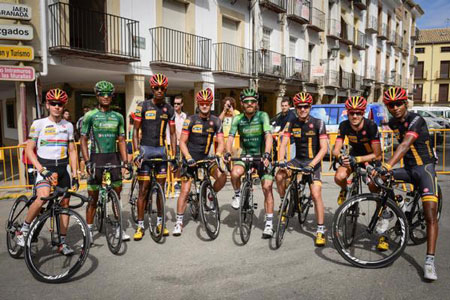
Simply making La Vuelta start-line was an achievement for the 8 African riders. All had to overcome intense heat, long stages, crashes, sickness and injuries to make it to the finish. This achievement was not only testimony to their ability, but their spirit and resolve. This is especially true for the riders from the World Cycling Centre Africa. Doug Ryder's claim We are at the dawn of exposing African cycling to the world is no longer prophesy, but reality.

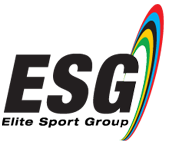 Rob Child, of the Elite Sport Group (ESG), is MTN-Qhubeka's nutritional biochemist and is often involved in the team's activities. As such, from time to time Rob takes some time to write an article for velowire.com to provide a look behind the scenes of the African team. Future stories will cover things like the World Cycling Center Africa, the new signings for the 2015 season for MTN-Qhubeka, but also more specific things related to Rob's main field of activity, the nutrition of the team. If you'd like to find out anything specific about the team, please feel free to ask. If possible, you might find the answer to your questions in one of Rob's future articles.
Rob Child, of the Elite Sport Group (ESG), is MTN-Qhubeka's nutritional biochemist and is often involved in the team's activities. As such, from time to time Rob takes some time to write an article for velowire.com to provide a look behind the scenes of the African team. Future stories will cover things like the World Cycling Center Africa, the new signings for the 2015 season for MTN-Qhubeka, but also more specific things related to Rob's main field of activity, the nutrition of the team. If you'd like to find out anything specific about the team, please feel free to ask. If possible, you might find the answer to your questions in one of Rob's future articles.
In the meantime, please don't hesitate to visit the Elite Sport Group's website or the official website of Team MTN-Qhubeka.
All photos in this article were provided by Rob Child, unless mentioned otherwise.
Vond u dit artikel interessant? Laat het uw vrienden op Facebook weten door op de buttons hieronder te klikken!
no comments yet | 6226 views
this publication is published in: Behind the scenes of MTN-Qhubeka | Vuelta a España 2014





 by marco1988 over
by marco1988 over
The participation of Africa's first Pro Continental team MTN-Qhubeka and Merhawi will forever concrete the Africa's place in cycling and will be the precursor of the next generation of African cyclists to take the World of Cycling by storm.